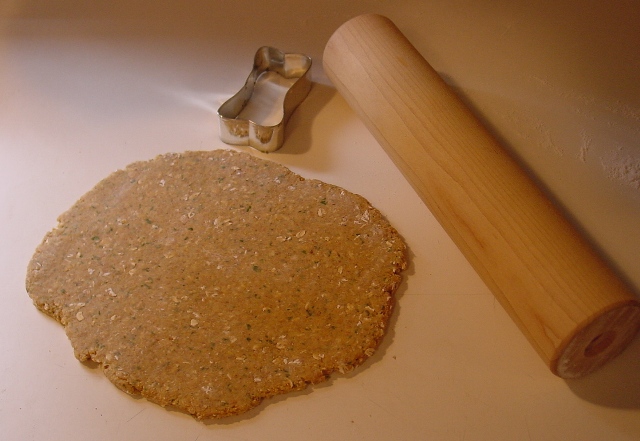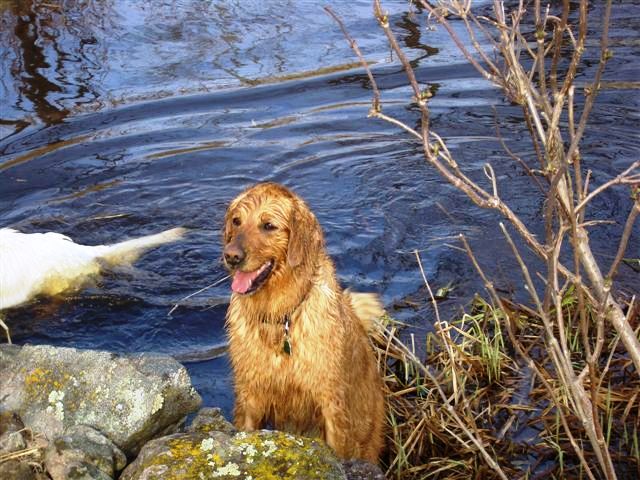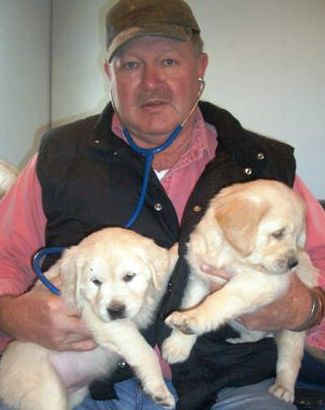Care & Nutrition
It’s all about the food…and home-baked treats in moderation!

We will discuss puppy development and the importance of proper diet at pick up time. Until then, here are some of our thoughts on pet food and nutrition:
- Avoid low-quality pet foods packed with empty calories and inferior grains and common allergens like corn, wheat and glutens from these sources!
- Like humans, dogs thrive on nutrient-dense foods. We recommend a complete diet including high quality protein sources such as lean poultry, beef, fish, venison, buffalo, egg and cheese (everyone likes a little cheese with their kibble now and then); high-quality fats from fish and vegetable sources with balanced Omega 3 and 6 fatty acids; vegetables and fruits; and high quality grains and starches like oats, barley, brown rice, sweet potato and pea flour.
- Also we advise that dry food be supplemented with enzymes and probiotics for optimum digestion. There are numerous sources regarding the role enzymes and probiotics play in a healthy diet. We recommend reading up on these topics and are believers in adding foods in their raw and natural state to your pet’s diet whenever possible. For more information on the role enzymes play in your pet’s diet check out http://www.housepetmagazine.com/four/Enzymes.htm. This online magazine has many thought-provoking articles on nutrition, enzymes and probiotics.
- Taking the steps to ensure your golden is provided a complete and well-balanced diet will pay off in years of vitality and vigor well into the “golden” years of their life. Your companion will be content, happy and well-balanced emotionally and physically with proper diet, and, of course, exercise! He or she will have more energy, their coats will be lustrous, soft and manageable, their skin supple, not dry and scaly and, big bonus…less to pick up in the yard!
We recently discovered this excellent and informative site: Dogfoodproject.com and it goes along with our thoughts on diet and nutrition. Of particular interest are the following links:
Stocking up for the arrival of your new puppy: These tips are provided in the AKC’s publication, “New Puppy Handbook” which also offers excellent advice on puppy care, development and training.
- High quality food and treats for training
- Food and water dishes
- Crate–to be replaced by bigger one as he grows–do not buy a huge crate for a puppy. A medium-sized crate offers the puppy more security when young. A smaller crate also keeps a puppy from eliminating in his crate while crate/potty training.
- Soft, adjustable collar (add new ones as he grows)
- Bedding
- Dog gate(s)
- At least one 4- to 6-foot leash, leather or webbing (an additional longer lead useful for training)
- At least 5-6 safe chew toys (the more the better, rotate toys) a note from us–beware of chew toys with preservatives and harmful chemicals–read our note on pig’s ears, below
- A soft-bristle brush
- Brush and sturdy metal comb
- Gentle puppy shampoo
- Good-quality dog nail trimmer
A little brushing goes a long way.

Start brushing your pet, gently, from little on and they will look forward to a good brushing throughout their life. Sophie gets brushed 3-5 times weekly. What takes only a few minutes outside saves lots of time cleaning inside!
Our #1 Training Tip: REWARD THE POSITIVE!
Our #2 Training Tip: CONSISTENCY IS KEY!
Our #3 Training Tip: YOUR DOG IS AN ANIMAL, NOT A PERSON!
Even the best behaved, most mellow pet can, at any time, revert back to its ancestral instincts given a particular situation. Always supervise pets, Goldens or otherwise, around children and other unfamiliar animals (friend’s pets, etc.). And, always supervise children around pets. Never allow a child to hit your pet.
Also, keep in mind that it’s your responsibility as a pet owner to adequately prepare before you bring the new pet home.
One of our favorite books for this preparation is:
I just got a puppy: What do I do? by Matthew Margolis. It’s a quick read that offers great tips for the entire family.
All our dogs are registered by the American Kennel Club. Their site provides excellent information on responsible pet ownership, health care tips and much more. For additional information check out akc.org

In response to several customer question about pet weight gain and food recommendations, here is a snippet on those subjects for our future South Branch families and their goldens…see below…this is our opinion only, and is based on over 70 years of experience developing diets for not only our goldens, but all our various South Branch inhabitants…including us!
Food & Nutrition: Some of this is stated above, but for food, we recommend a food higher in protein and fat and lower in carbs. Really, the Atkins diet is perfect for goldens! Dogs were not meant to consume mostly grains in the wild, and we believe in a food at minimum 28-30% protein with higher fat content for healthy skin and coat. Many diseases of the skin and lackluster hair can be traced back to diet (or overprocessing as the case may be:) Also, we DO advise supplementing diet with lean meats, fish, liver, cheese and a mashed cooked egg or two mixed with your golden’s food daily. Also, a bit of flaxseed oil drizzled over their food is a good idea and, if you can sneak in a fish oil tablet on occasion coated with gobs of peanut butter…good for you and them!
Thoughts on the incredible egg: Dogs love variety and eggs are one of the most perfect foods available in terms of fat, protein, amino acids and nutrients. So, we don’t think it’s the highly nourishing protein-dense table scraps that present the problem in overweight. Hamburger buns, yes…hamburgers, no. Vegetables are good for them, too. Whatever they will eat from the meat and vegetable (even berries) groups are great! Also, the higher meat and fat you feed, the less volume of poops to pick up in the yard! Excellent news!!
Thoughts on “expert” dog food recommendations: Don’t be swayed on diet and food selection based on the opinion of those who are involved in any aspect of the sale of dry dog food. Even though we make mention of some sources on the site, we believe the best food is food in its purest and simplest form: free of unnecessary additives, enzyme and nutrient destroying heat processing and dangerous chemical preservatives. Clean food direct from the source is what dogs eat in the wild and is what will provide them the longest, healthiest, disease-free life.
Below are some good sites we’ve found that are consistent with our thoughts on training, care and nutrition.
Your New Puppy. Great Resource for Most Puppy-Related Questions. Should be Read Before Getting a Dog:
http://www.canismajor.com/dog/tpuppy.html
Children and Puppies. Should be Read Before Bringing a Puppy into a Home with Small Children:
http://www.petmaze.com/html/children.html
Things to Consider Before Getting a Dog:
http://www.kidstrainingpuppies.com/pages/should.htm
Training Info & Pet Education:
Some Good Training Tips:
http://www.cyberpet.com/cyberdog/articles/lexi/pospup.htm
Drs. Foster and Smith Pet Education and Catalog Link:
http://www.peteducation.com/index.cfm?cls=2
Pets: A Good Thing:
Pet Owners. On the Road to Better Health:
http://www.mercola.com/2004/nov/17/dogs_health.htm
Pets Help us Cope with Stress:
http://www.mercola.com/2002/oct/9/stress_pets.htm
Pet Health & Diet:
Lawn Chemicals and Cancer in Dogs:
http://www.covenanthealth.org/healthnews/reuters/20040421elin008.htm
Lack of Vitamin C and Hip Dysplasia:
http://www.cyberpet.com/cyberdog/articles/health/vitc.htm
People Food. Is it good for Dogs?
http://www.mercola.com/2005/jan/8/antioxidants_pet.htm
Dog Treat Health Concerns:
http://www.mercola.com/2005/feb/19/pet_chew_treats.htm
Pig’s Ear Risks:
http://www.phac-aspc.gc.ca/publicat/ccdr-rmtc/00vol26/dr2606ea.html
Safe Pet Food Storage:
http://www.mercola.com/2005/jan/22/pet_food_storage.htm
Are Grains Needed in a Canine Diet:
http://www.mercola.com/2005/feb/5/pets_grains.htm
Nutritional Deficiency a Link to Epilepsy:
http://www.canine-epilepsy.com/healthydiet.html#NutritionalDeficiencies
Canine Over-Vaccination:
http://www.mercola.com/2003/apr/2/dog_vaccines.htm
Parasites and Pets:
http://www.biosci.ohio-state.edu/~parasite/pets.html
Animal Diseases and Transfer to Humans:
http://www.fda.gov/fdac/features/2004/104_pets.html
Thanks for your patience while we compile info and tips for this important section. In addition to the articles above, proper care, diet and health related topics are discussed in full at the time of pick up.
